The Physix Studio task chair’s seat structure is based on the idea of stretching a textile panel between the sides of the seat frame before adding a five-star base equipped with castors. With Physix Studio, despite its seemingly simple structure, designer Alberto Meda has taken the classic office chair to a whole new level by using state-of-the-art materials and production technologies to create a dynamic sitting experience and freedom of movement. The flexible frame, stabilizing mechanism and adjustable height guarantee optimal comfort by combining pliant and stiff elements. Due to its agility, Physix Studio is particularly suited for mobile and temporary work stations.
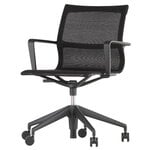
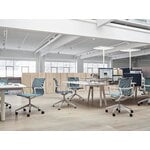

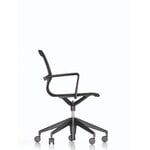
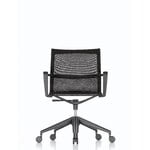
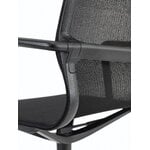
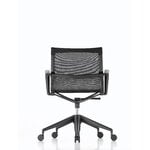
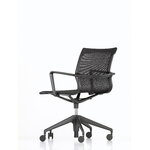
Physix Studio task chair, TrioKnit 06
Vitra
Description
The Physix Studio task chair’s seat structure is based on the idea of stretching a textile panel between the sides of the seat frame before adding a five-star base equipped with castors. With Physix Studio, despite its seemingly simple structure, designer Alberto Meda has taken the classic office chair to a whole new level by using state-of-the-art materials and production technologies to create a dynamic sitting experience and freedom of movement. The flexible frame, stabilizing mechanism and adjustable height guarantee optimal comfort by combining pliant and stiff elements. Due to its agility, Physix Studio is particularly suited for mobile and temporary work stations.
Product details (13)
- Colour
- Black
- Width
- 25 in (63.5 cm)
- Measurement details
- Width: Base 25 x 0 in (63.5 x cm, cm), seat 19.29 in (49 cm)
- Depth
- 31.5 in (80 cm)
- Seat depth
- 17.13 in (43.5 cm)
- Height
- 34.65–39.37 in (88–100 cm)
- Seat height
- 15.35–20.08 in (39–51 cm)
- Frame material
- Polyamide
- Upholstery fabric
- TrioKnit 06: 96% polyester, 4% spandex
- Abrasion resistance
- 40,000 Martindale
- Pilling
- 4-5
- Lightfastness
- 6
- Base material
- Die-cast aluminum, soft castors for hard floor
- Product ID
Designer
Alberto Meda (b. 1945) is an Italian designer, who worked in the 1970s as technical manager of Kartell, and started his freelance career in 1979. Meda has worked with many well-known brands such as Phillips, Alessi and Cinelli, and collaborared also with the Finnish ceramics brand Arabia. Meda has a background in engineering, and his designs are often characterized by a pragmaric mind and fine attention to details. Meda has been awarded with the Compasso d'oro for the Lola and Metropoli lamps designed for the Italian brand Luceplan, and his Water jug for Arabia won Chicago Athenaeum’s Good Design Award.
View all productsReviews (0)
Sustainability
The Product Sustainability Framework, our criteria of sustainable design, helps you find the most sustainable products in our selection. Read below which sustainability criteria this product has met.
Working conditions & labour 7/9
-
Equal opportunities for all employees
-
Commitment to UN Global Compact, fair compensation for all employees
-
Corporate responsibility requirements defined and communicated for suppliers
-
Systematic work for improved inclusion and well-being in the workplace
-
Transparent supply chain
-
Suppliers' compliance to a code of conduct ensured
-
Compliance to the UN Guiding Principles on Business and Human Rights ensured in the supply chain
-
Direct suppliers audited and certified
-
Support for community involvement in the supply chain
Eco-friendly production 7/9
-
Fair and resource-wise water-use in production
-
No incineration or landfilling of returned items
-
No use of endangered species as materials
-
No direct environmental emissions or waste (excl. GHGs) from production
-
Production and material sourcing that respect biodiversity, animal rights, and natural ecosystems
-
Material-efficient and ecological packaging
-
No potentially harmful chemicals used in own production
-
The sustainability of direct suppliers' production is addressed and monitored
-
Positive impact on nature’s well-being through operations that regenerate natural ecosystems
Climate impact 6/8
-
Company's direct greenhouse gas emissions identified and commitment to reduction
-
Product's carbon impact identified and commitment to reduction
-
Guidance on energy- and eco-efficient use of the product
-
Contribution to climate initiatives beyond the brand’s direct operations
-
Carbon footprint of the product calculated and goals set to reduce it
-
100 % renewable energy in own production and operations
-
Low-carbon or compensated transportation
-
Carbon neutral or carbon negative product
Sustainable materials 5/6
-
Sustainable and long-lasting material choices
-
No harmful or hazardous substances
-
Responsible raw material sourcing and production
-
Materials suited for circularity: monomaterials, recyclable finishings, renewable or recycled contents etc.
-
Ecological materials: natural, biodegradable, recyclable or recycled contents
-
Outstanding materials in terms of innovativeness, responsibility, sustainability and circularity: local production or sourcing, 100 % recycled content, C2C-certification etc.
Circular design 5/5
-
High aesthetic quality promoting long-term use of the product
-
Technically durable product design and material choices
-
Design for enduring life-long quality
-
Design and support for product maintenance, repair and upgradability
-
Innovative circular design solutions: circular service system, resale platform, remanufacturing, collection of used products, etc.









